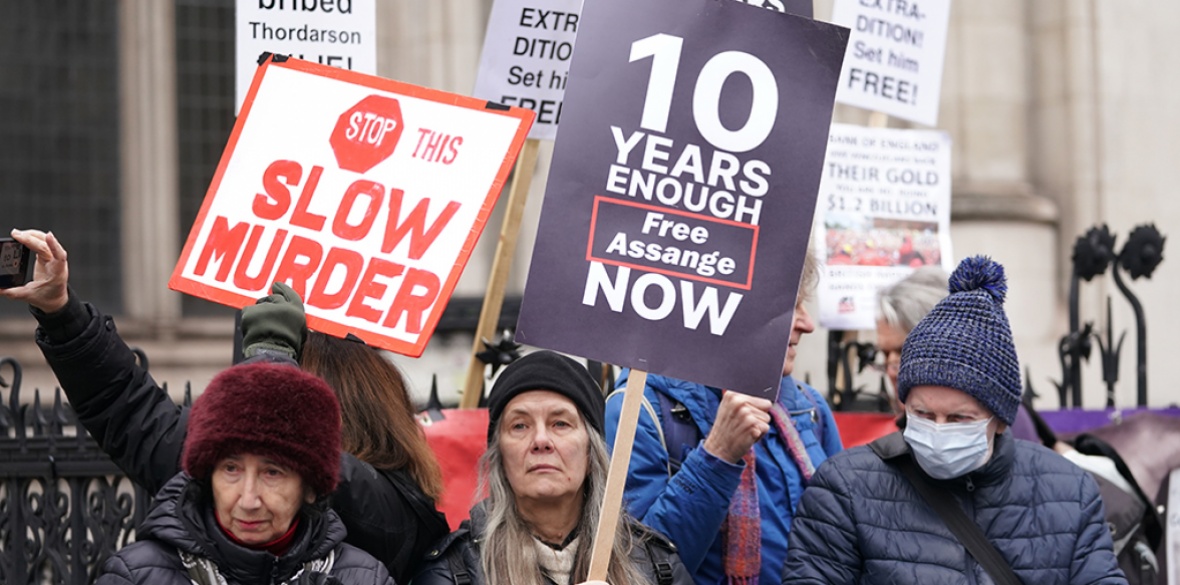
JULIAN ASSANGE would be free within days if the mass media ended its “deafening silence” over persecution of the Wikileaks founder, a UN expert claimed today.
UN special rapporteur on torture Nils Melzer accused major news outlets of failing to play their role as the “fourth estate” to inform the public about the implications of the case against Mr Assange on press freedom and the rule of law.
The UN official said he had previously believed the press would “jump on” evidence pointing to “political persecution and gross judicial arbitrariness” in the case. But instead he has faced a “wall of silence.”
“This man has become so untouchable because of the narrative that has been created, but there is no evidence of that,” Mr Melzer told a media briefing organised by the Foreign Press Association on Friday on his new book The Trial of Julian Assange.
“[The press] are not able to play their role as the fourth estate and inform the public about due process violations that are being played here behind the curtains. That really what I found is extremely concerning.”
Mr Melzer’s book details the findings of his two-year investigation into Mr Assange’s case. In it he accuses Britain, the US, Sweden and Ecuador of “grave and systematic due process violations,” judicial bias and manipulating evidence.
He also accuses the US and British authorities of colluding to secure a conviction against the Wikileaks founder, who is facing extradition to the US due to his publication of confidential documents exposing war crimes in Iraq and Afghanistan.
“If the US succeeds in prosecuting this man and sending him to a supermax prison for the rest of his life this will have an enormous chilling effect on free press,” he warned.
Mr Melzer initially declined to get involved in the case when approached in 2018, writing that his perception of Mr Assange had been distorted by prejudice due the “demonisation” of Mr Assange by the authorities and the press.
Eventually changing his mind, Mr Melzer visited Mr Assange at high-security Belmarsh prison in 2019, where he has been held for more than three year in solitary confinement.
Following an examination he concluded that Mr Assange’s treatment was tantamount to “psychological torture.”
Despite the grave findings, Mr Melzer said the British authorities have refused to co-operate with him to clear up the allegations or initiate an investigation required by international law, which he described as “profoundly shocking.”
Similarly, he said he was “very alarmed” by the “muted” response of the press to his findings.
Giving an example, Mr Melzer said he had given televised interviews to the BBC and Sky News in 2019 on his report, warning against the extradition of Mr Assange, that were subsequently removed “without trace” from the web.
When he called the BBC to ask why the interview had been taken down, he said he was told that the topic was not newsworthy.
“This attitude to me reflects an unwillingness to actually look at the elephant in the room,” he said.
“The silence is deafening. If the main media organisations joined forces I believe this case would be over within days.
“The media is not here to entertain us — it is here to empower us, it is the fourth estate for a reason and it is important that they keep fulfilling that societal role.”
Mr Melzer noted that the BBC had kept the report on its website and in a radio broadcast, but that this would not have achieved the same global impact as the televised interview.
The UN official, who has been in the role since 2016, added that there was “no legal basis” for keeping Mr Assange locked up and that evidence for charges over computer hacking had been “fabricated.”
Mr Assange revealed some of the “most grave crimes” committed by governments, Mr Melzer added, including the murder of civilians and torture, however no-one has been prosecuted even with video evidence.
“That really is shocking, where you can see that war crimes are not being prosecuted but those who expose them are being prosecuted.
“That displays a systemic problem of enormous proportions.
“We cannot have legitimate dissent and exposure of serious government’s crimes resulting in impunity for officials and life sentences for witnesses and whistleblowers and journalists. This is extremely dangerous.”
A BBC spokesperson said: “The BBC covered this story on a number of its platforms. An interview with Nils Melzer was broadcast live on our international news channel, which is available in 465 million homes around the world, and his comments were featured prominently on our news website, which is available both within and outside of the UK.”
No comments:
Post a Comment